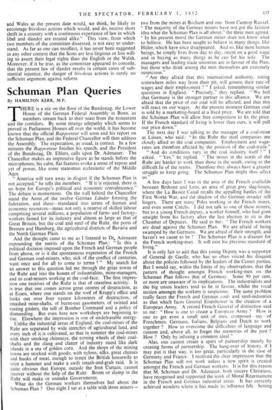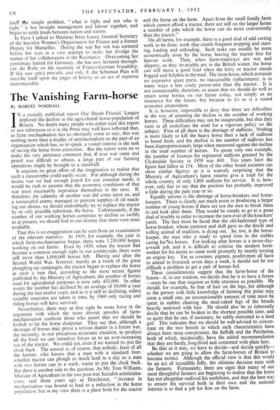Schuman Plan Queries
By HAMILTON KERR, M P.
THERE is a stir on the floor of the Bundestag, the Lower House of the German Federal Assembly in Bonn, as members stream back to their seats from the restaurant and the corridors. By some strange telepathy which seems to prevail in Parliament Houses all over the world, it has become known that the official Rap porteur will soon end his report on the Schuman Plan, and the Federal Chancellor will then address the Assembly. The expectation, as usual, is correct. In a few minutes the Rapporteur finishes his speech, and the President of the Bundestag, Dr. Ehlers, calls upon Dr. Adenauer. The Chancellor makes an impressive figure as he stands before the microphones; his calm, flat features evoke a sense of repose and yet of power, like some statesman ecclesiastic of the Middle Ages.
"America will turn away in disgust if the Schuman Plan is not accepted," he tells the members. " If it is rejected, there is no hope for Europe's political and economic convalescence." The debate is momentous. On the wall behind the Chancellor stand the Arms ,of the twelve German Lander forming the federation, and these—translated into terms of human and economic resources—mean not only a reserve of skilled labour comprising several millions, a population of farm- and factory- workers famed for its industry and almost as large as that of Great Britain, but the coal and steel of the Ruhr, the ports of Bremen and Hamburg, the agricultural districts of Bavaria and the North German Plain. , And the thought came to me as I listened to Dc Adenauer expounding the merits of the Schuman Plan : "Is this a political decision imposed upon the French and German people from above, or is it the spontaneous expression of the French and German coal-miners, who, sick of the conflict of centuries, want once and for all to come to terms ? " My search for an answer to this question led me through the great towns of the Ruhr and into the homes of industrialists, mine-managers, and to coal-miners working at the-coal-face. The first impres- sion one receives of the Ruhr is that of ceaseless activity. It is true that one comes across great centres of destruction, as at Essen, where one stands on the roof of Krupp's office and looks out over four square kilometres of destruction, of smashed mine-shafts, of burnt-out gasometers, of twisted and rusting girders, the toll of Bomber Command and a policy of dismantling. But even here new workshops are beginning to rise. Elsewhere the impression is one of undefeatable energy. Unlike the industrial areas of England, the coal-mines of the Ruhr are separated by wide stretches of agricultural land, and every inch of it is cultivated, so that in summer the coal-mines with their smoking chimneys, the turning wheels of their coal- shafts and the clang and clatter of industry stand like dark islands in a sea of golden corn. And the shops of the mining towns are stocked with goods; with nylons, silks, great cheeses and hunks of meat, enough to tempt the British housewife to seize a hammer and make a swift smash-and-grab raid. It is quite obvious that Europe, outside the Iron Curtain, cannot recover without the help of the Ruhr. Boom or slump in the Ruhr will make or unmake Governments.
What do the German workers themselves feel about the Schuman Plan ? One night I sat at a table with three miners— two from the mines at Bochum and one from Castrop Rauxel. "The majority of the German miners have not got the faintest idea what the Schuman Plan is all about," the three men agreed. "In his present mood the German miner does not know what to believe. He has been taught to believe in many things, like Hitler, which have since disappeared. And so, like most human beings, he simply lives from day to day, intent on a good wage and in buying as many things as he can for his wife. The managers and leading trade unionists are in favour of the Plan, but those who think among the men themselves are extremely suspicious."
"Are they afraid that this international authority, sitting somewhere miles way from their pit, will govern their rate of wages and their employment ? " I asked, remembering similar questions in England. Precisely," they replied. "We feel that Germany is the stronger partner in this alliance. We are afraid that the price of our coal will be affected, and that this will react on our wages. At the present moment German coal is sold by a marketing-board at a fixed price. We are told that the Schuman Plan will allow free competition to fix the price. If the French standard of living is lower than ours, it will pull our price down."
The next day I was talking to the manager of a coal-mine at Liinen, who said : "In the Ruhr the steel companies aye closely allied to the coal companies. Employment and wage- rates are therefore affected by the position of the coal-trade."
"And do conditions vary in the coal industry itself ? " I asked. " Yes," he replied. "The mines in the north of the Ruhr are harder to work than those in the south, owing to the difficult lie of the seams. Therefore they always have a greater struggle to keep going. The Schuman Plan might thus affect us.
A few days later I was in the area of the French coalfields between Bethune and Lens, an area of great grey slag-heaps, where the La Bass& Canal recalls the appalling battles of the First World War, and the shadow of the German invader still lingers. There are many Poles working in the French mines, and even some Czechs. I did not talk to one of these miners, but to a young French deputy, a worker himself, who had gone straight from his factory after the last election to sit in the Chamber of Deputies. He said to me : "The French workers are dead against the Schuman Plan. We are afraid of being swamped by the Germans. We are afraid of their strength, and haven't we cause to be ? The Schuman Plan is a disaster for the French working-man. It will ruin his precious standard of living."
It is only fair to add that this young Deputy was a supporter of General de Gaulle, who has so often voiced his disquiet about the policies followed by the leaders of the Centre parties. But I would say, within the limits of my observations, that the pattern of thought amongst French working-men on the Schuman Plan follows that of Gerrnany. Some 90 per cent. or more are unaware of its implications. The industrialists and the big union leaders tend to be in favour, whilst the vocal section amongst the workers is suspicious. The same problem really faces the French and German coal- and steel-industries as that which faces General Eisenhower in the creation of a European Army. A retired French General of distinction said to me: "How is one to create a European Army ? How is one to get even a small unit of men. composed—say—of Frenchmen, Germans, Italians, Belgians and Dutch to work together ? How to overcome the difficulties of language and custom and, above all, to forget the memories of the past ? How ? Only by infusing a common ideal." Alas, one cannot create a spirit of partnership merely by creating forms of partnership. The hang-over of history, if I may put it that way, is too great, particularly in the case of Germany and France. I received the clear impression that the Schuman Plan will not work unless a new spirit is created amongst the French and German workers. It is for this reason that M. Schuman and Dr. Adenauer, both sincere Christians, have recognised and supported the work of Moral Rearmament in the French and German industrial areas. It has certainly achieved wonders where it has made its influence felt. Setting itself the simple problem, "what is right and not who is right " it has brought management and labour together, and begun to settle feuds between nation and nation.
In Paris I talked to Madame Irene Laure, General Secretary of the Socialist Women's Organisation for France and a former Deputy for Marseilles. During the war her son was tortured before her eyes in a vain attempt to make her divulge the names of her collaborators in the Resistance. Overcoming her passionate hatred for Germany, she has now lectured through- out the Ruhr on the necessity of Franco-German friendship. If this new spirit prevails, and only if, the Schuman Plan will inscribe itself upon the pages of history as an act of supreme statesmanship.



































 Previous page
Previous page